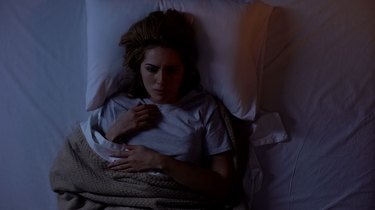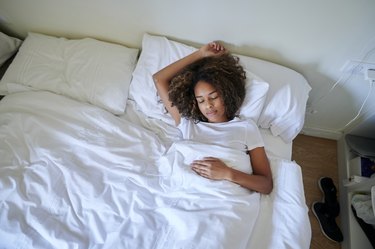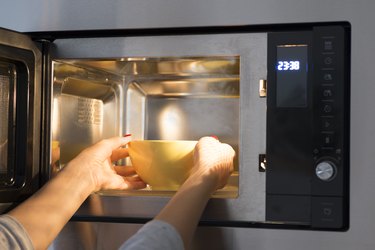
You're settled in bed and are just about to drift off when — what's that?! You get this weird feeling that someone else is in the room. Or even stranger, a feeling that someone is getting into bed with you.
But it's not an intruder or a ghost. It's just your brain playing tricks on you.
Video of the Day
Video of the Day
Even so, the experience can be deeply unsettling. So if you feel a presence in the room while sleeping, you may want to understand why — and what you can do about it.
Turns out, you're likely either experiencing a sleep hallucination or sleep paralysis. Here's what that means, along with what causes these strange visions or feelings.
Sleep Hallucinations and Sleep Paralysis, Explained
Sleep hallucinations can happen as you're about to drift off or just as you're waking up, says Shelby Harris, PsyD, a psychologist specializing in sleep medicine and Director of Sleep Health at Sleepopolis.
The experiences, which are brief and occur as your brain is transitioning between sleep and wakefulness (or vice versa), tend to have a visual component, like seeing a person or an animal in your room, according to the book Fundamentals of Sleep Medicine.
It's also not uncommon to feel like you're falling or floating, or to hear sounds or voices that aren't there. You might jerk or twitch, too.
Sleep paralysis is a similar phenomenon where you can't move or speak right as you're waking up. It's sometimes accompanied by hallucinations, like seeing, hearing or sensing the presence of someone who isn't actually there, notes the National Library of Medicine.
Sleep paralysis usually happens after being in REM sleep, the stage of sleep where most dreams happen.
"During REM sleep, your body is paralyzed for protective reasons, so you don't act out your dreams," Harris explains. The paralysis can linger for a minute or two as you resume consciousness, so you feel awake but aren't yet able to move your body.
Sleep hallucinations and sleep paralysis aren't typically every-night occurrences. In fact, most of us will only experience them from time to time, Harris says.
That said, certain factors or underlying conditions, like the ones below, can make them more likely.
Causes and Risk Factors
1. You're Sleep-Deprived
Simply falling short on sleep can make you more prone to sleep hallucinations or sleep paralysis.
"If you haven't gotten enough sleep, especially REM sleep, your body might try to rebound with more REM sleep," Harris says, which makes hallucinations or paralysis more likely.
And the longer you go without getting enough sleep, the more prone you might be.
Fix It
If you're struggling to get the recommended seven to nine hours of sleep each night, start by buckling down on healthy sleep habits, Harris recommends. (This seven-day plan can help you get started.)
Establish a relaxing bedtime routine, limit your screen use and try to stick with the same bedtime and wake time. If you suspect your caffeine or alcohol intake is factoring in, try to cut back, recommends the National Library of Medicine.
2. You're Stressed
Any kind of stressful life event — like an illness, relationship change, moving or work difficulties — can up the odds for sleep paralysis or sleep hallucinations, the National Library of Medicine notes.
The reasons why aren't fully understood, but it could be due to the fact that heavy stress can make it harder to sleep well.
Fix It
Again, focusing on the basics of healthy sleep may make it easier to nod off, Harris says.
General stress-management practices might help too, like doing daily meditation or breathing exercises, getting regular exercise, journaling, seeking out a support group or talking to a therapist.
3. You're on a New Medication
If the feeling of a nighttime visitor came around when you started a new medication, the drug could be to blame.
Many prescription meds can increase the risk for visual hallucinations, both during the day and as you're falling asleep and waking up, according to the American Academy of Ophthalmology.
One of the most common culprits linked to sleep paralysis is ADHD medications, the National Library of Medicine says.
Fix It
Talk with your doctor if you suspect a new medication is affecting your sleep. Together you can discuss ways to manage the problem, like switching to another medication or lowering your dose.
4. You Have an Underlying Sleep Issue
Certain sleep disorders can up the risk for sleep paralysis or sleep hallucinations. One common culprit is sleep apnea, Harris says, which can disrupt your sleep and leave you sleep-deprived.
Sleep hallucinations are also a common symptom of narcolepsy, according to the Cleveland Clinic.
Fix It
If you've been doubling down on your sleep hygiene for a few weeks and aren't seeing much progress, talk with your doctor. They may recommend you undergo a sleep study to test for underlying sleep disorders.
5. You Have Trauma or PTSD
Post-traumatic stress disorder, or PTSD, which can occur after experiencing a terrifying event, is known for causing nightmares. But the problem can disrupt a person's sleep in other ways, too, by increasing the risk for sleep hallucinations or sleep paralysis, per a November 2021 Frontiers in Psychiatry review.
PTSD can cause other symptoms, including flashbacks or unwanted memories related to the traumatic event, severe stress around things that remind you of the event, feeling numb or hopeless and feeling detached from friends, family or activities you used to enjoy, per the Mayo Clinic.
Fix It
The condition can be treated with psychotherapy and medications, according to the Mayo Clinic. So if you're experiencing symptoms, talk with your doctor or a mental health professional.
When to See a Doctor
Let your doctor know if you're feeling like someone is in your room at night more than once in a while, or if the experience is making you anxious or stressed, Harris says.
While occasionally sensing someone else in the room probably isn't cause for concern, if it's happening regularly, it could be a sign or an underlying sleep or mental health issue that needs to be addressed.
- Fundamentals in Sleep Medicine: "Chapter 28 - Parasomnias"
- National Library of Medicine: "Sleep Paralysis"
- National Library of Medicine: "StatPearls: Sleep Paralysis"
- Frontiers in Neurology: "Meditation-Relaxation (MR Therapy) for Sleep Paralysis: A Pilot Study in Patients With Narcolepsy"
- American Academy of Ophthalmology: "Medication-Related Visual Hallucinations: What You Need to Know"
- Cleveland Clinic: "Hypnagogic Hallucinations"
- Frontiers in Psychiatry: "Disturbed Sleep in PTSD: Thinking Beyond Nightmares"
- Mayo Clinic: "Post-Traumatic Stress Disorder"
Is this an emergency? If you are experiencing serious medical symptoms, please see the National Library of Medicine’s list of signs you need emergency medical attention or call 911.


